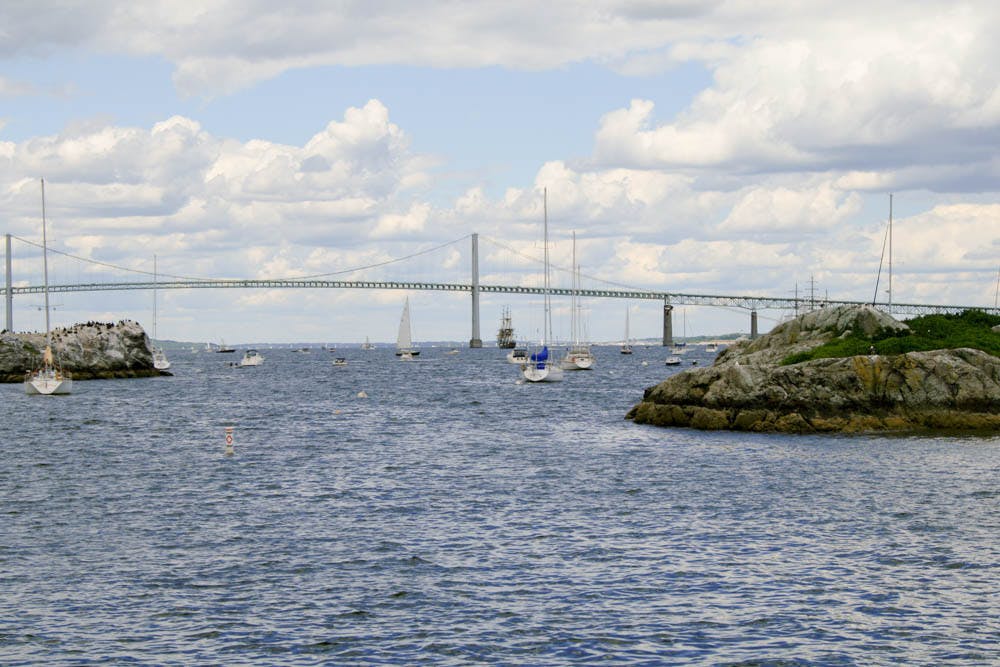A new report on the health of Rhode Island’s Narragansett Bay shows that it is getting cleaner as a result of decades of investments in wastewater treatment and restrictions on harmful chemicals. Though scientists are continuing to monitor the effect that this reduced pollution is having on the ecosystem and on the shellfish, fish and sea grasses that call the bay home, early indications suggest it is getting healthier. Yet urban areas in Rhode Island are expanding, resulting in a loss of forested area and an increase in runoff and pollution. At the same time, climate change is warming the water and threatening the infrastructure that keeps it — and us — safe. And as always, more research is needed to completely understand the health of the bay at the risk posed by climate change.
These five findings, the distilled overview of a 500-page technical report, are the result of a three-year, peer-reviewed research project by the Narragansett Bay Estuary Program and a variety of universities, organizations and agencies in both Massachusetts and Rhode Island. Yet despite its robustness and relevance — Narragansett Bay borders Providence and makes up the vast majority of the 33 percent of Rhode Island that is covered by water — the report’s authors were forbidden to present its findings at a conference in Providence last Monday by the EPA.
You can read the report online. You should read the report online, or at least the 28-page summary or the one-page overview of the summary, mostly because anything Environmental Protection Agency Administrator Scott Pruitt thinks is worth suppressing is probably worth reading. But if you do read it, you will immediately realize that this is not the type of subversive threat to national security one would generally associate with government censorship or a cover-up. In reality, it’s a wonky series of facts evaluating the health of one of New England’s major bodies of water, and its only call to action is continued vigilance. All Rhode Islanders — and indeed, all Americans and all humans — should have the right to access information like this to know if the ecosystem they live in will make them sick. When the Trump administration decides to hide this information from the public, to play down the importance of reports like these and to gag the authors who worked for years to bring them to light, they are actively endangering the people and land they were elected to protect.
Neil Degrasse Tyson, the celebrated astrophysicist, has a famous saying: “The good thing about science (is) it’s true whether or not you believe in it.” In the case of climate change, that’s not a particularly good thing, but it holds true regardless. Climate change will continue to rage no matter how many climate deniers hold influential government posts. Pruitt and the Trump administration can stop scientists from presenting their work, but they can’t render their findings inaccurate.
That’s not for lack of trying. President Trump, along with his supporters, seems to delight in telling the intellectuals of the world that they’re not as smart as they think they are. Whether staring at the eclipse or burying climate change research, Trump scores points with his base by deriding the data-driven analysts who think they have all the answers. As a result, science has become a lot less apolitical.
I’m not a scientist, but I can see the danger in allowing science to be co-opted by one political party and made to seem biased. Any society in which a segment of the population thinks science is working against them is in danger. And, of course, there are risks related to the politicization of science. In fact, no one is warier of the dangers of politicizing science than scientists themselves. When last April’s March for Science brought over a million participants to the streets, protesting the administration’s war on facts, it also provoked a backlash from inside the scientific world (as well as outside), insisting that scientists should remain in the lab, leaving the policymaking up to the politicians. The environmentalist and activist Bill McKibben has been criticized similarly in the past, for transferring his environmental science expertise into activism. But in an age of gaslighting and fake news, the reliable scientific voice is one of the few sources of unbiased honesty we have left. How can we afford to silence that?
I’m not calling for all environmental scientists and ecologists to leave the lab and run for office, or for them to start drafting legislation. But they absolutely should be using their voices, as loudly as possible, to spread the word about their increasingly dire findings. For the rest of us, well, we need to be paying attention. We need to amplify and spread the message of our most knowledgeable voices and stand up where they are muzzled, as a group of Rhode Island residents, Brown students and professors did last week. We need to pick sides in the war on facts. The Narragansett Bay may be getting cleaner, but our political system, and our planet, are sick and getting sicker. We’re going to need science to nurse both back to health.
Clare Steinman ’19 can be reached at clare_steinman@brown.edu. Please send responses to this opinion to letters@browndailyherald.com and other op-eds to opinions@browndailyherald.com.



